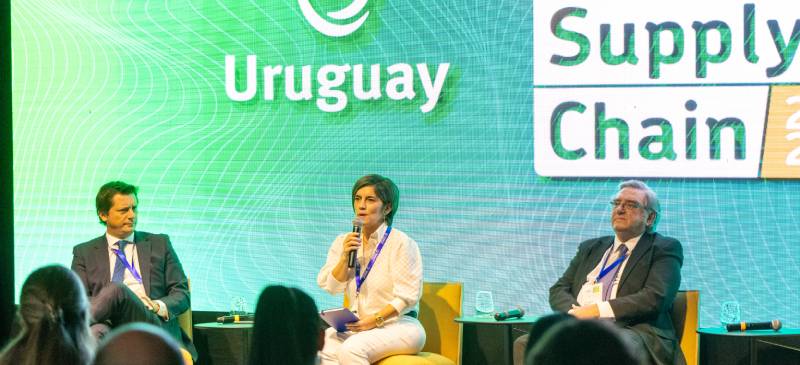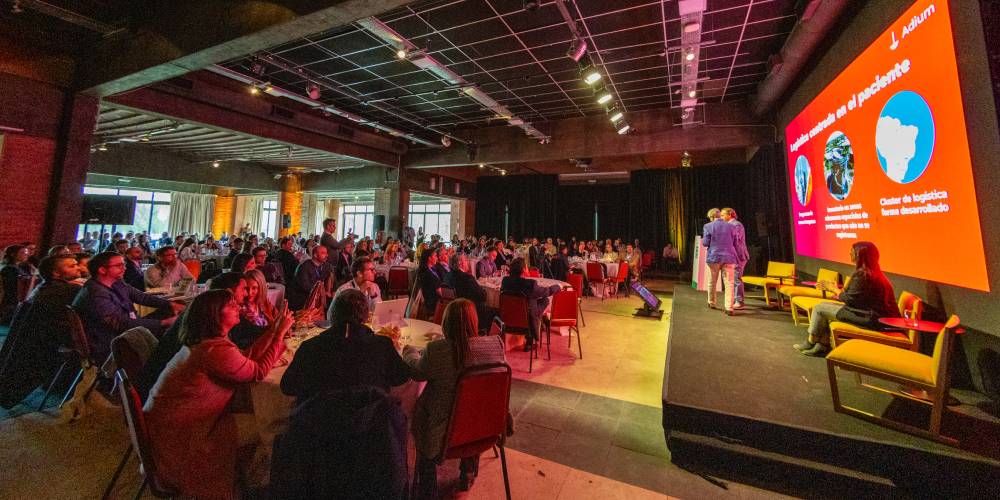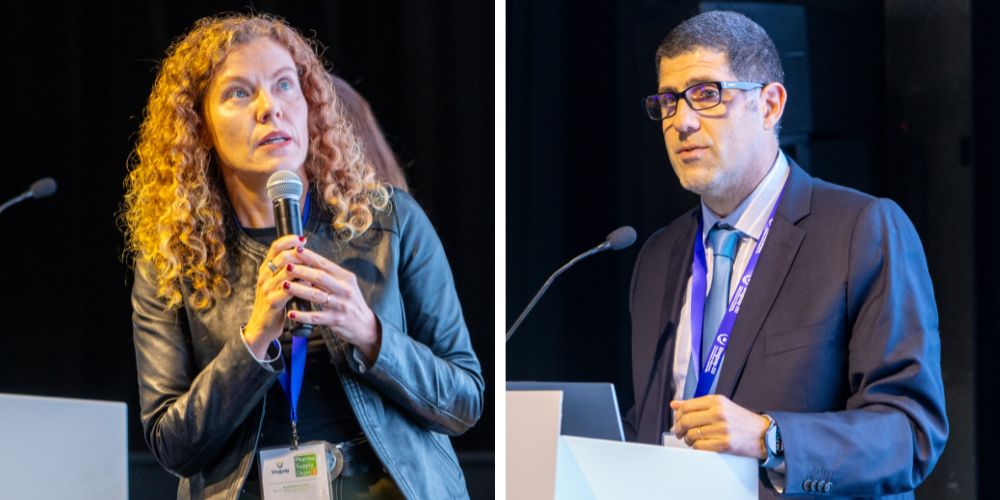- Home
- About us
- News
- Events
- EXPORT Export
-
BUY
Buy
Buy
- INVEST Invest
- COUNTRY BRAND Country Brand
-
INFORMATION CENTER
Information center
InformationCenterInformationCenterReports Country reports Department reports Foreign trade reports Product-Destination worksheet Sectors reports Work documentsStatistical information Classification Uruguay XXI Exports Imports Innovative National Effort Macroeconomic Monitor Tools Buyers Exporters Investors
- Contact
-
Languages
Uruguay consolidates its position as a logistics and innovation hub for the pharmaceutical industry
The fifth edition of Uruguay Best Practices in Pharma Supply Chain confirmed the country’s leadership in pharmaceutical logistics.
Share:

Uruguay reaffirmed its position as a key logistics hub for the pharmaceutical industry in Latin America in a new edition of Uruguay Best Practices in Pharma Supply Chain. Declared of National Interest by the Presidency of the Republic brought together almost 300 national and international leaders, showing why Uruguay has positioned itself as an epicenter of innovation and sustainable development in the pharmaceutical sector.
The meeting is organized by the Uruguay Pharma HUB group, formed by the international companies Adium Pharma, AstraZeneca, Boehringer Ingelheim, Glaxo Smith and Kline, Mega Labs, Merck, Pfizer, and Roche, leaders in the pharmaceutical industry with logistics and supply chain operations in Uruguay. The public sector, represented by the National Investment and Export Promotion Agency, Uruguay XXI, and the National Logistics Institute (INALOG), works with this group.
On this occasion, the event focused on crucial issues for the sector’s development: continuous process improvements, impact, and commitment to innovation, sustainability, and future trends.
The opening was in charge of the president of INALOG, Álvaro Olazábal, the International Logistics Manager of AstraZeneca, Alejandra Silveira, representing the Uruguay Pharma HUB group, and the executive director of Uruguay XXI, Sebastián Risso, who highlighted the collaboration between the public and private sectors as a pillar of success.

“We are delighted to see how the public and private sectors work together. Uruguay has become a distribution hub for the entire Americas, with nearly US$900 million in pharmaceuticals transiting the country last year. This demonstrates our capacity as a regional distribution platform,” Risso commented.
He also noted that the country employs some 7,500 people in the pharmaceutical and medical device industry, of which 1,500 are directly linked to pharmaceutical logistics. This number impacts a much larger number in similar industries.
Silveira emphasized the importance of sharing best practices. “The sector’s growth depends on our ability to collaborate and share knowledge with the logistics chain. The community we have formed is a fundamental part of the success of this call,” he said.
Olazábal highlighted the pharma sector’s success in Uruguay and attributed it to good practices and talent development. “Companies compete strongly but have worked together to establish common objectives. This has allowed Uruguay to position itself as a regional logistics hub,” he said.

Public-private collaboration and the use of advanced technology as keys to success
The meeting featured prominent national and international speakers who addressed achievements and challenges in the sector from different perspectives, including Argentina’s Leandro Mbarak, founder of Pharma.IA brought a technological perspective to the event, highlighting the application of artificial intelligence (AI) in pharmaceutical logistics.
“AI optimizes both quality and efficiency. In Uruguay, we are working with several companies to implement specific solutions that quickly demonstrate its benefits,” explained Mbarak, who has been observing the sector’s growth in the country for over a decade.
He added that Uruguay’s advanced infrastructure and investments in technology give the country a significant competitive advantage. “This event was an enriching experience because of its high technical and organizational quality. It reaffirms Uruguay’s role as a logistics and innovation hub in the region,” he concluded.
The meeting underlined that Uruguay is already thinking about the challenges of the future and that it is doing so with an offer of advantages and tools that allow it to have a dynamic and high-quality pharma sector. Its legal, political, and social stability are the factors that international investors point out as highly valued. These conditions, together with advanced infrastructure and robust legislation with more than 30 years of regimes such as free port and airport, free trade zones, and temporary admission, are what have made Uruguay a logistics hub with unique conditions that allow access to the region with the latest generation of medicines.
In this regard, Roche’s Deputy Director of International Business Affairs, José Rivero, highlighted the cooperation between companies and the public sector as the key to consolidating Uruguay as a logistics hub. “The stability of the country and the close collaboration between sectors have been fundamental. We see a real commitment to sustainability and innovation, which is essential for our continued growth,” he said.
He also highlighted how the country’s education and idiosyncrasies contributed to this collaborative environment.
Uruguay is committed to being an innovation hub
Uruguay’s robust innovation ecosystem involves all actors, from academia and government to companies and startups that join in generating new proposals. Professor Jackson Bartz, representative of UTEC’s Logistics Engineering program, highlighted the importance of education and research in the country’s logistics development. “Our graduates are already making a difference in companies. We are building alliances and developing projects that will reduce costs and improve logistics in the pharmaceutical sector,” said Bartz, who recalled the recent inauguration of an international airport in Rivera as an example of these advances.
“This event is very rich in information and opportunities for companies and different entities to get involved,” added Bartz. He announced that during the event, he was able to get two companies to commit to working on new projects with students from the north of the country.

Ignacio Boschi, who was coordinator of the Logistics Innovation Program of the National Agency for Research and Innovation (ANII), expressed that there is very good co-participation of the different State agencies to assemble and develop the innovation ecosystem, which he considered has grown a lot. “I am proud to see in this event projects that ANII has supported and that are applied in the reality of our country and with the potential to also spill over to the regional level and to be this projects at the global level, which are at the forefront of technology,” he added.
The meeting also focused on how Uruguay has demonstrated that it is perfectly possible to balance economic growth and sustainable development.
The co-founder of Farmalog, Fabiana Moller, who presented her sustainable project during the meeting, stressed that Uruguay is a country that can easily serve as an example for a variety of projects. “I believe that sustainability is one. We can, with some not-so-big movements, give a very important impact and serve as an image,” she expressed.
Uruguay’s Best Practices in Pharma Supply Chain highlighted Uruguay’s current strengths as a logistics hub and underscored its commitment to innovation and sustainability. With advanced infrastructure, political stability, and a robust innovation ecosystem, Uruguay is positioned as a regional leader in pharmaceutical logistics, ready to face future challenges and continue to grow in an increasingly competitive global market.
